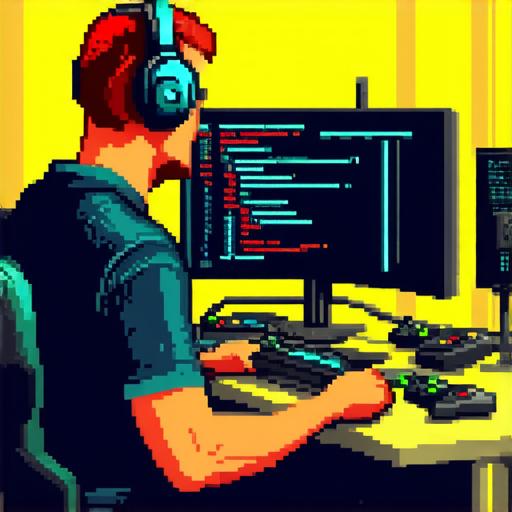Creating your own video game is an exciting and rewarding process that allows you to showcase your creativity and imagination. Whether you are new to game development or have been working on games for years, there is always something new to learn about creating engaging and immersive games. In this article, we will guide you through the process of creating your own video game from start to finish, including tips and tricks for optimizing your game’s performance, engaging players, and maximizing its potential for success.
Before You Begin: Understanding Your Goals and Budget

Before diving into the world of game development, it is important to have a clear understanding of what you want to achieve with your game. Are you looking to create a simple mobile app or a complex console game? What platforms do you plan to target, such as PC, iOS, Android, or consoles? What are your budget constraints, and how much time are you willing to invest in the development process?
Once you have established your goals and budget, you can begin researching the best tools and technologies for creating your game. For example, if you are looking to create a mobile game, you may want to use Unity or Unreal Engine, both of which offer powerful features for mobile game development.
Designing Your Game: Creating a Compelling Concept and Prototype
The first step in creating your own video game is designing the concept and prototype. This involves brainstorming ideas, creating a storyboard, and developing a basic model of the game’s mechanics and features. It is important to keep in mind that the prototype should be simple and easy to play, with clear objectives and goals for the player.
One of the best ways to start designing your game is by creating a list of core concepts and themes that will resonate with your target audience. This could include elements such as puzzles, action, adventure, or strategy games.
Development Process: Creating the Game Engine and Assets
The next step in creating your own video game is the development process. This involves building the game engine, creating assets such as characters, environments, and sound effects, and programming the game’s mechanics and features.
When choosing a game engine, you will need to consider the platform you are targeting and the complexity of the game. For example, if you are creating a mobile game, you may want to use Unity or Unreal Engine. If you are creating a console game, you may opt for more advanced engines such as Godot or CryEngine.
Optimizing Performance: Improving Game Speed and Stability
One of the most important aspects of creating a successful video game is optimizing its performance. This involves improving the game’s speed and stability to ensure that it runs smoothly on all platforms and devices.
There are several ways to optimize performance, including reducing the number of draw calls, minimizing texture usage, and using compression techniques for textures and audio. Additionally, you can use profiling tools to identify areas of your code that are causing performance issues and optimize them accordingly.
Engaging Players: Creating an Immersive Game Experience
The key to creating a successful video game is engaging players and keeping them coming back for more. This involves creating an immersive game experience that keeps players motivated and entertained.
To engage players, you will need to create a compelling storyline and characters that players can relate to. You should also create challenging gameplay mechanics that require players to use their skills and strategy to progress through the game. Additionally, incorporating elements such as rewards, achievements, and social sharing can help keep players motivated and engaged.
Real-Life Examples: Successful Games and Their Development Processes
There are many successful games that have been created by individuals or small teams. One example is Minecraft, which was created by Markus Persson and sold to Microsoft for $2.5 billion in 2014. Another example is Angry Birds, which was created by Rovio Entertainment and has since become one of the most successful mobile games of all time.
Both Minecraft and Angry Birds were developed using similar processes as other games, including designing a concept and prototype, building the game engine, creating assets, programming the mechanics and features, optimizing performance, and engaging players. However, these games were also able to achieve success through their unique gameplay mechanics, compelling storylines, and social sharing features.
FAQs: Answering Common Questions About Game Development
Q: What programming languages are best for game development?
A: The choice of programming language for game development depends on the platform and engine you plan to use. For example, Unity uses C, while Unreal Engine uses C++ and Blueprints. Other popular languages include Java, Python, and JavaScript.
Q: How long does it take to create a video game?
A: The time it takes to create a video game can vary widely depending on the complexity of the game, the size of the development team, and the resources available. Simple mobile games can be created in a few months, while complex console games can take several years to complete.
Q: What tools do I need to create a video game?
A: The tools you will need to create a video game include a computer with a powerful processor and graphics card, game development software such as Unity or Unreal Engine, and creative software such as 3D modeling and animation software. Additionally, you may need specialized equipment such as motion capture technology or VR headsets depending on the type of game you are creating.
Q: What is the best way to learn game development?
A: The best way to learn game development is through a combination of online tutorials, courses, and hands-on experience. Many online platforms such as Udemy, Coursera, and edX offer courses on game development that can be completed at your own pace. Additionally, joining online communities and forums dedicated to game development can provide valuable resources and support.
Q: What are the biggest challenges of creating a successful video game?
A: The biggest challenges of creating a successful video game include designing a compelling concept and prototype, building a game engine that runs smoothly on all platforms and devices, creating engaging assets and mechanics, and optimizing performance to ensure a smooth gameplay experience. Additionally, marketing and distribution can also be challenging for new game developers.




